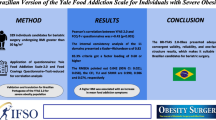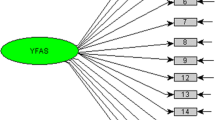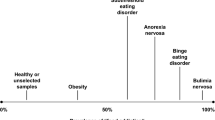Abstract
Purpose
Rising rates of obesity have been recently associated to the novel concept of food addiction (FA). The Yale Food Addiction Scale (YFAS) is the most widely used measure for examining FA (1) and analysis of its reliability and validity is expected to facilitate empirical research on the construct. Here, we tested the psychometric properties of a Portuguese version of the YFAS (P-YFAS), establishing its factor structure, reliability and construct validity.
Methods
Data were obtained from 468 Portuguese individuals, 278 sampled from non-clinical populations, and 190 among obese candidates for weight-loss surgery. A battery of self-report measures of eating behavior was applied.
Results
Confirmatory factor analysis verified a one-factor structure with acceptable fit, with item analysis suggesting the need to eliminate item 24 from the P-YFAS. Internal consistency (KR-20 = .82) and test–retest stability were adequate. Correlation analyses supported convergent and divergent validity of the P-YFAS, particularly in the clinical sample. Both FA symptom count and diagnosis, according to the P-YFAS, adequately discriminated between samples, with classification of FA met by 2.5 and 25.8% of the participants in the non-clinical and clinical samples, respectively.
Conclusions
These findings reinforce the use of P-YFAS in non-clinical and clinical populations. Future directions for extending YFAS validation are discussed.
Similar content being viewed by others
References
Burmeister JM, Hinman N, Koball A, Hoffmann DA, Carels RA (2013) Food addiction in adults seeking weight loss treatment. Implications for psychosocial health and weight loss. Appetite 60:103–110. doi:10.1016/j.appet.2012.09.013
Ng M, Fleming T, Robinson M, Thomson B, Graetz N, Margono C et al (2014) Global, regional, and national prevalence of overweight and obesity in children and adults during 1980–2013: a systematic analysis for the Global Burden of Disease Study 2013. Lancet 384:766–781. doi:10.1016/S0140-6736(14)60460-8
Oliveira-Maia J, Roberts CD, Simon SA, Nicolelis MAL (2011) Gustatory and reward brain circuits in the control of food intake. Adv Tech Stand Neurosurg 36:31–59. doi:10.1007/978-3-7091-0179-7_3
Schulte E, Joyner M, Potenza M, Grilo C, Gearhardt A (2015) Current considerations regarding food addiction. Curr Psychiatry Rep 17:1–8. doi:10.1007/s11920-015-0563-3
Fortuna JL (2012) The obesity epidemic and food addiction: clinical similarities to drug dependence. J Psychoact Drugs 44:56–63. doi:10.1080/02791072.2012.662092
Gearhardt AN, Corbin WR, Brownell KD (2009) Food addiction: an examination of the diagnostic criteria for dependence. J Addict Med 3:1–7. doi:10.1097/ADM.0b013e318193c993
Gearhardt AN, White MA, Potenza MN (2011) Binge eating disorder and food addiction. Curr Drug Abus Rev 4:201–207
Davis C, Carter JC (2009) Compulsive overeating as an addiction disorder. A review of theory and evidence. Appetite 53:1–8. doi:10.1016/j.appet.2009.05.018
Meule A (2011) How prevalent is ‘food addiction’? Front Psychiatry 2:1–4. doi:10.3389/fpsyt.2011.00061
Davis C (2013) From passive overeating to “Food Addiction”: a spectrum of compulsion and severity. ISRN Obes 2013:1–20. doi:10.1155/2013/435027
Ziauddeen H, Fletcher PC (2013) Is food addiction a valid and useful concept? Obes Rev 14:19–28. doi:10.1111/j.1467-789X.2012.01046.x
Gearhardt AN, Corbin WR, Brownell KD (2009) Preliminary validation of the Yale Food Addiction Scale. Appetite 52:430–436. doi:10.1016/j.appet.2008.12.003
American Psychiatric Association (2000) Diagnostic and statistical manual of mental disorders, 4th edn. American Psychiatric Press, Washington
Meule A, Gearhardt AN (2014) Five years of the Yale Food Addiction Scale: Taking stock and moving forward. Curr Addict Rep 1:193–205. doi:10.1007/s40429-014-0021-z
Meule A, Gearhardt AN (2014) Food Addiction in the Light of DSM-5. Nutrients 6:3653–3671. doi:10.3390/nu6093653
Meule A, Vögele C, Kübler A (2012) German translation and validation of the Yale Food Addiction Scale. Diagnostica 58:115–126. doi:10.1026/0012-1924/a000047
Brunault P, Ballon N, Gaillard P, Réveillère C, Courtois R (2014) Validation of the French version of the Yale Food Addiction Scale: an examination of its factor structure, reliability, and construct validity in a nonclinical sample. Can J Psychiatry 59:276–284
Chen G, Tang Z, Guo G, Liu X, Xiao S (2015) The Chinese version of the Yale Food Addiction Scale: an examination of its validation in a sample of female adolescents. Eat Behav 18:97–102. doi:10.1016/j.eatbeh.2015.05.002
Granero R, Hilker I, Agüera Z, Jiménez-Murcia S, Sauchelli S, Islam MA et al (2014) Food Addiction in a Spanish Sample of Eating Disorders: DSM-5 Diagnostic Subtype Differentiation and Validation Data. Eur Eat Disord Rev 22:389–396. doi:10.1002/erv.2311
Innamorati M, Imperatori C, Manzoni G, Lamis D, Castelnuovo G, Tamburello A et al (2015) Psychometric properties of the Italian Yale Food Addiction Scale in overweight and obese patients. Eat Weight Disord 20:119–127. doi:10.1007/s40519-014-0142-3
Davis C, Curtis C, Levitan RD, Carter JC, Kaplan AS, Kennedy JL (2011) Evidence that food addiction is a valid phenotype of obesity. Appetite 57:711–717. doi:10.1016/j.appet.2011.08.017
Meule A, Heckel D, Kübler A (2012) Factor structure and item analysis of the Yale Food Addiction Scale in obese candidates for bariatric surgery. Eur Eat Disord Rev 20:419–422. doi:10.1002/erv.2189
Clark SM, Saules KK (2013) Validation of the Yale Food Addiction Scale among a weight-loss surgery population. Eat Behav 14:216–219. doi:10.1016/j.eatbeh.2013.01.002
Pursey KM, Stanwell P, Gearhardt AN, Collins CE, Burrows TL (2014) The prevalence of food addiction as assessed by the Yale Food Addiction Scale: a systematic review. Nutrients 6:4552–4590. doi:10.3390/nu6104552
Lent MR, Eichen DM, Goldbacher E, Wadden TA, Foster GD (2014) Relationship of food addiction to weight loss and attrition during obesity treatment. Obesity 22:52–55. doi:10.1002/oby.20512
Ribeiro G, Santos O, Camacho M, Torres S, Mucha-Vieira F, Sampaio D et al (2015) Translation, cultural adaptation and validation of the power of food scale for use by adult populations in Portugal. Acta Med Port 28:575–582
Lowe MR, Butryn ML, Didie ER, Annunziato RA, Thomas JG, Crerand CE et al (2009) The Power of Food Scale. A new measure of the psychological influence of the food environment. Appetite 53:114–118. doi:10.1016/j.appet.2009.05.016
Viana V, Sinde S (2003) Estilo Alimentar: Adaptação e validação do Questionário Holandês do Comportamento Alimentar. Psic Teor Inve Prat 1:59–71
Van Strien T, Frijters JER, Bergers G, Defares PB (1986) The Dutch Eating Behavior Questionnaire (DEBQ) for assessment of restrained, emotional, and external eating behavior. Int J Eat Disord 5:295–315
Machado PP, Gonçalves S, Martins C, Soares IC (2001) The Portuguese version of the Eating Disorders Inventory: Evaluation of its psychometric properties. Eur Eat Disord Rev 9:43–52. doi:10.1111/papt.12048
Garner DM, Olmsted MP, Polivy J (1983) Development and validation of a multidimensional Eating Disorder Inventory for anorexia nervosa and bulimia. Int J Eat Disord 2:15–34
Tapadinhas AR, Pais-Ribeiro J (2012) Validação da escala de ingestão compulsiva (BES). Um estudo com uma amostra de obesos portugueses. Atas do 9º Congresso Nacional de Psicologia da Saúde. Lisboa: Placebo Editora. pp 1330–35
Gormally J, Black S, Daston S, Rardin D (1982) The assessment of binge eating severity among obese persons. Addict Behav 7:47–55. doi:10.1016/0306-4603(82)90024-7
Weiss BD, Mays MZ, Martz W, Castro KM, DeWalt DA, Pignone MP et al (2005) Quick assessment of literacy in primary care: the newest vital sign. Ann Fam Med 3:514–522. doi:10.1370/afm.405
Santos O, Oliveira A, Carvalho C, Lunet N, Azevedo A, Paiva D et al (2012) Self-administration of the Newest Vital Sign in Portuguese young adults: study of its internal reliability. Int J Behav Med 19:S189
Spitzer RL, Williams JBW, Gibbon M, First MB (1990) Structured Clinican Interview for DSM-III-R (SCID). American Psychiatric Press, Washington
Tavares M (1996) Entrevista clínica estruturada para o DSM-IV: Transtornos do eixo I-edição para pacientes (SCID-I/P 2.0). Instituto de Psicologia, Universidade de Brasília
Gudmundsson E (2009) Guidelines for translating and adapting psychological instruments. Nord Psychol 61:29–45. doi:10.1027/1901-2276.61.2.29
Hu L, Bentler PM (1999) Cutoff criteria for fit indexes in covariance structure analysis: Conventional criteria versus new alternatives. Struct Equ Model 6:1–55. doi:10.1080/10705519909540118
Byrne BM (2010) Structural equation modelling with AMOS: Basic concepts, applications, and programming, 2nd edn. Routledge, New York
Yu CY (2002) Evaluating cutoff criteria of model fit indices for latent variable models with binary and continuous outcomes. University of California, Los Angeles
Barrett P (2007) Structural equation modelling: Adjudging model fit. Pers Individ Differ 42:815–824. doi:10.1016/j.paid.2006.09.018
Kline RB (2005) Principles and practice of structural equation modeling, 2nd edn. Guilford Press, New York
Mustelin L, Kärkkäinen U, Kaprio J, Keski-Rahkonen A (2016) The Eating Disorder Inventory in the screening for DSM-5 binge eating disorder. Eat Behav 22:145–148. doi:10.1016/j.eatbeh.2016.06.011
de Ridder D, Adriaanse M, Evers C, Verhoeven A (2014) Who diets? Most people and especially when they worry about food. Appetite 80:103–108. doi:10.1016/j.appet.2014.05.011
Pursey KM, Collins CE, Stanwell P, Burrows TL (2016) The stability of ‘food addiction’ as assessed by the Yale Food Addiction Scale in a non-clinical population over 18-months. Appetite 96:533–538. doi:10.1016/j.appet.2015.10.015
Pepino MY, Stein RI, Eagon JC, Klein S (2014) Bariatric surgery-induced weight loss causes remission of food addiction in extreme obesity. Obesity 22:1792–1798. doi:10.1002/oby.20797
Pedram P, Wadden D, Amini P, Gulliver W, Randell E, Cahill F et al (2013) Food addiction: its prevalence and significant association with obesity in the general population. PLoS One 8:e74832. doi:10.1371/journal.pone.0074832
Bennett S, Dodge T (2007) Ethnic-racial differences in feelings of embarrassment associated with binge eating and fear of losing control. Int J Eat Disord 40:454–459. doi:10.1002/eat.20374
Vitousek KB, Daly J, Heiser C (1991) Reconstructing the internal world of the eating-disordered individual: Overcoming distortion in self-report. Int J Eat Disord 10:647–666. doi:10.1002/1098-108X(199111)10:6<647:AID-EAT2260100604>3.0.CO;2-T
Acknowledgements
The authors would like to thank Ashley Gearhardt (Department of Psychology, University of Michigan) for providing access to the Yale Food Addiction Scale and contributing to the adaptation process. We would also like to thank Centro Hospitalar de S. João, Hospital São Bernardo, Faculdade de Ciências da Nutrição e Alimentação da Universidade do Porto, Hospital Espírito Santo de Évora, Instituto do Emprego e Formação Profissional, Universidade Atlântica and Universidade de Évora, in particular Ana André, André Ferreira, Andreia Santos, António-Roma-Torres, Armando Raimundo, Carlos Trindade, Cecília Silva, Cristina Pontes, Manuel Carvalho, Margarida Pegacho, Mónica Silva, Rita Fernandes and Sara Pacheco, for assistance with recruitment of participants.
Author information
Authors and Affiliations
Corresponding author
Ethics declarations
Funding
This work was supported by Fundação para a Ciência e Tecnologia through a Junior Research and Career Development Award from the Harvard Medical Portugal Program (HMSP/ICJ/0020/2011) to AJO-M and CPUP (UID/PSI/00050/2013) to ST, and a Grant from the BIAL Foundation (176/10) to AJO-M.
Conflict of interest
On behalf of all authors, the corresponding author states that there is no conflict of interest.
Ethical approval
All procedures performed in this study were in accordance with the ethical standards of the institutional and/or national research committee and with the 1964 Helsinki declaration and its later amendments or comparable ethical standards.
Informed consent
Informed consent was obtained from all individual participants included in the study.
Additional information
This article is part of the topical collection on Food addiction.
Electronic supplementary material
Below is the link to the electronic supplementary material.
Rights and permissions
About this article
Cite this article
Torres, S., Camacho, M., Costa, P. et al. Psychometric properties of the Portuguese version of the Yale Food Addiction Scale. Eat Weight Disord 22, 259–267 (2017). https://doi.org/10.1007/s40519-016-0349-6
Received:
Accepted:
Published:
Issue Date:
DOI: https://doi.org/10.1007/s40519-016-0349-6




